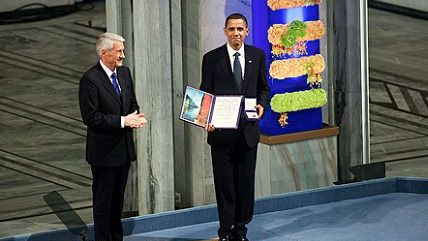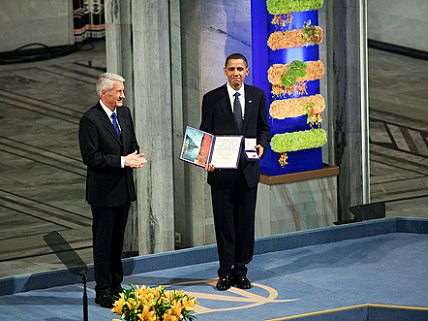Was the Decision to Award the Nobel Peace Prize to Chemical Weapons Inspectors an Admission That Awarding Barack Obama Was a Mistake?
The 2013 Nobel Peace Prize laureate helped prevent a war agitated for by the 2009 laureate


The Nobel Committee announced today that it had decided to award this year's Nobel Peace Prize to the Organization for the Prohibition of Chemical Weapons (OPCW), an intergovernmental organization established via the (1993) Chemical Weapons Convention, an international treaty that bans chemical weapons, when it came into force in 1997, the year the United States and several other countries ratified it, bringing the total ratifications to the 65 required for the treaty to go into effect.
The OPCW received the award for its "extensive efforts to eliminate chemical weapons," according to the Nobel Committee's press release, which mentions Syria only once (that the recent usage of chemical weapons there "have underlined the need to enhance the efforts to do away with such weapons"). Notably, however, the Nobel Committee does not mention any specific instance of the OPCW eliminating a chemical weapons stockpile in any country, as it is currently in the process of doing in Syria. While the process for making the Peace Prize selection begins the September of the previous year, with nominations due by February, it is hard to imagine the OPCW winning outside its role of preventing a military intervention in Syria.
When Secretary of State John Kerry suggested Syria surrender its chemical weapons to avoid a Western attack, he meant it only rhetorically. Yet Syria's ally Russia jumped at the opportunity, helping to arrange the current involvement by the OPCW. In contrast, as President Obama was pushing the notion of "red lines" and military interventions, he appealed to the idea of "international norms" the US both exempts itself from and would attempt to enforce unilaterally. What President Obama did not do is appeal to the OPCW or offer to aid them in their work to "eliminate chemical weapons."
The eventual participation of the OPCW, 2013 Nobel Peace Prize laureate, in the Syria crisis helped to defuse the situation and avoid a war that President Obama, the 2009 Nobel Peace Prize laureate, seemed eager to get started. Will the Norwegians admit they made a mistake? Or was it Bush's fault?
Editor's Note: As of February 29, 2024, commenting privileges on reason.com posts are limited to Reason Plus subscribers. Past commenters are grandfathered in for a temporary period. Subscribe here to preserve your ability to comment. Your Reason Plus subscription also gives you an ad-free version of reason.com, along with full access to the digital edition and archives of Reason magazine. We request that comments be civil and on-topic. We do not moderate or assume any responsibility for comments, which are owned by the readers who post them. Comments do not represent the views of reason.com or Reason Foundation. We reserve the right to delete any comment and ban commenters for any reason at any time. Comments may only be edited within 5 minutes of posting. Report abuses.
Please to post comments


If they want to admit the mistake, they should have actually awarded it to George W. Bush.
Didn't Bush give a bunch of aid to Africa to help with malaria prevention and AIDS?
What has Obama done that's comparable?
Obamacare?
The Millennium Fund was it?
Didn't Bush give a bunch of aid to Africa
Please don't phrase it this way. It wasn't Bush's personal, own money that he "gave". As laudable as the goals of PEPFAR are, it's still funded by stolen money.
Yet Syria's ally Russia jumped at the opportunity, helping to arrange the current involvement by the OPCW. In contrast, as President Obama was pushing the notion of "red lines" and military interventions, he appealed to the idea of "international norms" the US both exempts itself from and would attempt to enforce unilaterally. What President Obama did not do is appeal to the OPCW or offer to aid them in their work to "eliminate chemical weapons."
So really, Putin and the Russian foreign secretary should get the Nobel Peace Prize. They did, after all, prevent another Western war in the Middle East.
They might want to see how the events play out first. Keep Putin on his toes so he doesn't slack on keeping Obama in line.
Yeah, this whole Syria thing could still go South in a hurry. But then, Obama got his Prize for nothing more than talking about stuff he would like to maybe do. Why not the OPCW or Putin?
Putin is not black and looks more Daniel Craig in a suit than a young Sydney Potier.
Teambuilding is for suckers. And "ending nuclear/chemical/any kinda" weapons "proliferation" is a fool's noble errand.
But a million bucks buys a lotta pussy. Of course, when ya own a big chunk of the bloody third world, the babies just come with the scenery....
Great song.
If the Nobel Committee really wanted to walk back their 2009 Peace Prize, they would have given the 2013 prize to Edward Snowden.
Then I would have to start taking the Peace Prize seriously again (like when I was a child) and I'm just not prepared to do that.
Perhaps they couldn't technically do it this year: nobody heard about Snowden last February. But next year it's his turn.
I don't know whether Snowden could get it, or even how likely/unlikely it is, but you're right that it was impossible this year because of the February deadline. The OPCW may have been obscure in February, but these IGOs tend to have boosters who nominate them for all kinds of prizes every year, even ones that seem completely unrealistic for them to win, like the Nobel Peace Prize for the OPCW, before the Syria crisis
That's exactly what I meant. And no, I don't believe they'll give the prize to Snowden any time soon.
That would have been the way to go.
Still can't believe the Nobel committee gave Obama a peace prize.
I still don't know what he did to deserve it.
Neither does he.
Uh... it strikes me more like a repeat.
It's like they're trying to be influential or something, handing out pre-emptive nobels and hoping this will influence people to earn them.
Meh. Nobel Peace Prize has been a joke for decades.
Per the will of Alfred Nobel, the Prizes can't be revoked once awarded. It's a blanket policy that serves as their answer to any effort to "revoke" a prize, and it's necessary not only because it gets them out of the business of reviewing past decisions, but because the Prizes come with a significant cash prize whose return can't be demanded.